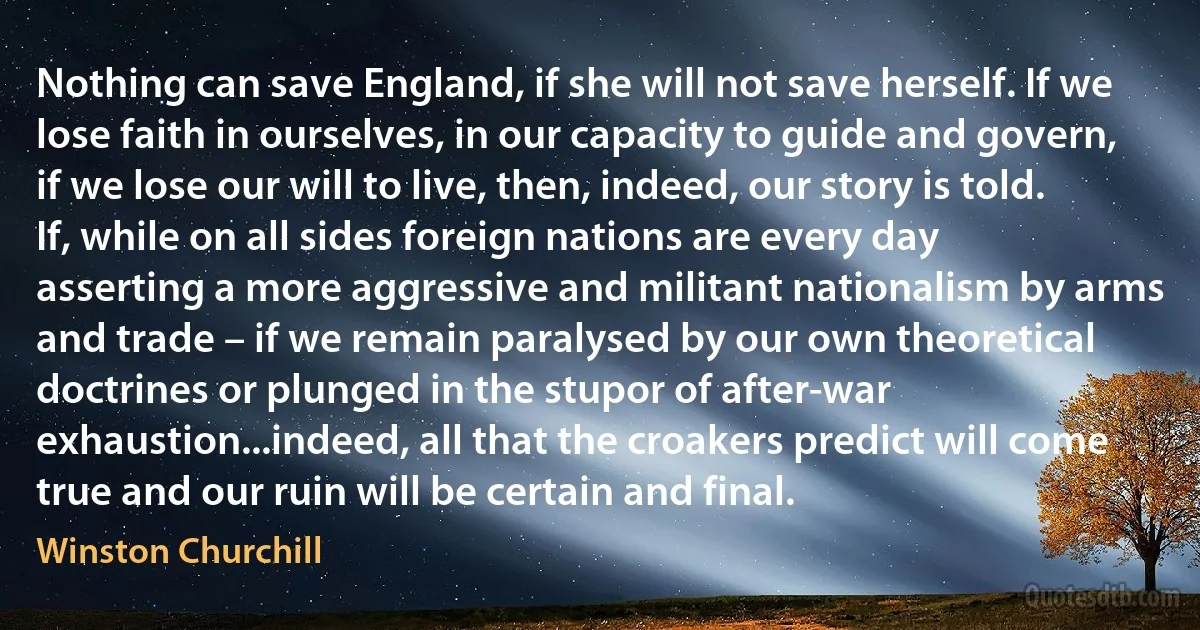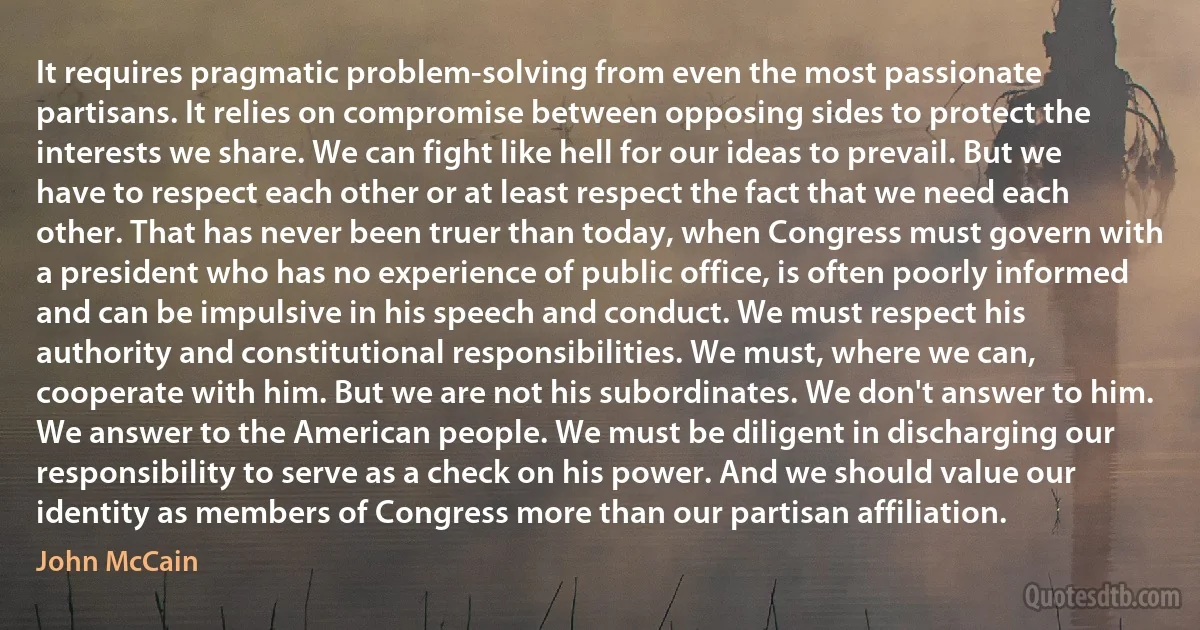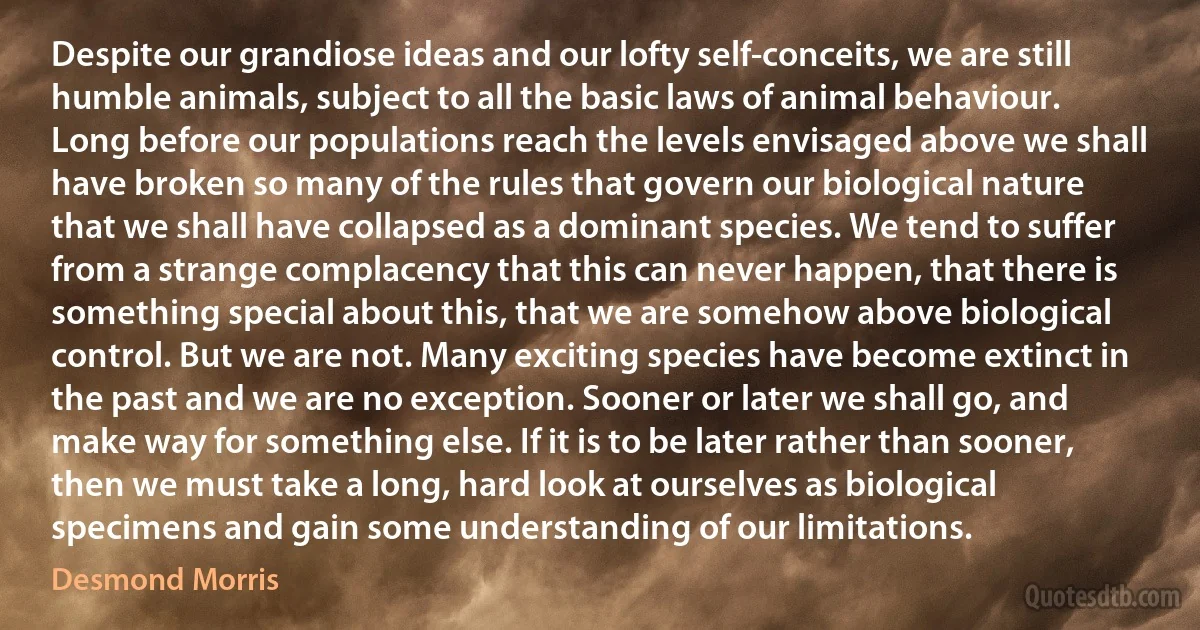Govern Quotes - page 20
Laws just or unjust may govern men's actions. Tyrannies may restrain or regulate their words. The machinery of propaganda may pack their minds with falsehood and deny them truth for many generations of time. But the soul of man thus held in trance or frozen in a long night can be awakened by a spark coming from God knows where and in a moment the whole structure of lies and oppression is on trial for its life.

Winston Churchill
There are some who lack confidence in the integrity and capacity of the people to govern themselves. To all who entertain such fears I will most respectfully say that I entertain none... If a man is not capable, and is not to be trusted with the government of himself, is he to be trusted with the government of others... Who, then, will govern? The answer must be, Man - for we have no angels in the shape of men, as yet, who are willing to take charge of our political affairs.

Andrew Johnson
All those... who discourse concerning nature, always subject a certain other nature of... elements, to the infinite... But no one of those who make the elements to be finite introduces infinity. Such, however, as make infinite elements, as Anaxagoras and Democritus, say that the infinite is continuous by contact. ...Rationally, too, do all philosophers consider the infinite as a principle; for it cannot be in vain, nor can any other power be present with it than that of a principle: for all things are either the principle, or from the principle; but of the infinite there is no principle, since otherwise it would have an end. ...it is also unbegotten and uncorruptible, as being a certain principle: for... end is the corruption of everything. ...It likewise appears to comprehend and govern all things, as those assert who do not introduce other causes beside the infinite... It would seem also that this is divine: for it is immortal and indestructible, as Anaximander says, and most of the physiologists.

Aristotle
God said, "I am tired of kings,”-
But that was a long while ago!
And meantime man said, "No,-
I like their looks in their robes and rings.”
So he crowned a few more,
And they went on playing the game as before,
Fighting and spoiling things.Man said, "I am tired of kings!
Sons of the robber-chiefs of yore,
They make me pay for their lust and their war;
I am the puppet, they pull the strings;
The blood of my heart is the wine they drink.
I will govern myself for awhile I think,
And see what that brings!”Then God, who made the first remark,
Smiled in the dark.

Henry van Dyke
The founding of our Nation was more than a political event; it was an act of faith, a promise to Americans and to the entire world. The Declaration of Independence declared that people can govern themselves, that they can live in freedom with equal rights, that they can respect the rights of others.

Gerald Ford
When we behold the mighty universe that surrounds us, and dart our contemplation into the eternity of space, filled with innumerable orbs, revolving in eternal harmony, how paltry must the tales of the Old and New Testaments, profanely called the word of God, appear to thoughtful man! The stupendous wisdom and unerring order that reign and govern throughout this wondrous whole, and call us to reflection, put to shame the Bible!

Thomas Paine
There never did, there never will, and there never can, exist a Parliament, or any description of men, or any generation of men, in any country, possessed of the right or the power of binding and controlling posterity to the "end of time," or of commanding for ever how the world shall be governed, or who shall govern it; and therefore all such clauses, acts or declarations by which the makers of them attempt to do what they have neither the right nor the power to do, nor the power to execute, are in themselves null and void. Every age and generation must be as free to act for itself in all cases as the age and generations which preceded it. The vanity and presumption of governing beyond the grave is the most ridiculous and insolent of all tyrannies. Man has no property in man; neither has any generation a property in the generations which are to follow.

Thomas Paine
Hayek sees that the zero-sum vision is fired by an implacable negative energy. It is not the concrete vision of some real alternative that animates the socialist critic of the capitalist order. It is hostility toward the actual, and in particular toward those who enjoy advantages within it. Hence the belief in equality remains vague and undefined, except negatively. For it is essentially a weapon against the existing order – a way of undermining its claims to legitimacy, by discovering a victim for every form of success. The striving for equality is, in other words, based in ressentiment in Nietzsche's sense, the state of mind that Max Scheler identified as the principal motive behind the socialist orthodoxy of his day. It is one of the major problems of modern politics, which no classical liberal could possibly solve, how to govern a society in which resentment has acquired the kind of privileged social, intellectual, and political position that we witness today.

Friedrich Hayek
Against Machiavelli's princely interpretation of the new nationalism, Britain alone of the great national States successfully held out, turned back the tide of despotism, and elaborated a system by which a debating club of elected persons could successfully govern an Empire in peace and in war.

G. M. Trevelyan
I wish I had a flair for writing, as then I am certain this regiment would get the credit due them when the history of this operation is finally written. Now everyone knows, but in a few years what is written will govern. I will do a better job of getting the facts in my reports than I did in the past war. I will also claim everything due the regiment.

Chesty Puller
Greece since the 4th of August became an anticommunist State, an antiparliamentary State, a totalitarian State. A State based on its peasants and workers, and so antiplutocratic. There is not, of course, a particular party to govern. This party is all the People, except of the incorrigible communists and the reactionary politicians of the old parties.

Ioannis Metaxas
The Labor Party has no objection whatever to the Germans practicing nazi-ism in Germany; that is their concern. We do not engage in any philisophic discussions with them about that system so long as they make no endeavour to foist it by force upon people outside their country. We stand for self-government. In the same way, we offer no opinions regarding the justification or non-justification of bolshevism in Russia; that is the concern of the Russian people. Their form of government is their own affair, just as our form of government is our affair. The Labor Party believes in the right of peoples to govern themselves, and to enjoy a way of life which they themselves decide upon. We concede that right to Russia. We concede that right to Germany, and it is because we are claiming it for ourselves, and Germany denies it to us, that we are at war with Germany.

John Curtin
It is our political machinery which fails. Unrivalled as an instrument for enfeebling the arm of Government, and therefore hindering an excess of executive interference, it has prevented the oppressions into which the zeal of Continental bureaus constantly betrays them. It satisfies the most imperious want of a free people, which is to be let alone. It is not ineffective for purposes of mere destruction, especially when it is driven by the forces of sectarian animosity. But in matters where it is necessary that Government should govern and create, it lamentably breaks down. All the virtues that are attributed to it-in many respects justly-for the concerns of peace, make it helpless for the purposes of war.

Robert Gascoyne-Cecil, 3rd Marquess of Salisbury
We have two duties before us; we have the duty of maintaining law and order for the sake, not only of the loyal population, but also for the population which breaks it, and we have the duty of securing the loyal population from such a change in the Constitution of the country as shall place their dearest interests in peril. It is idle to talk of leaving the Irish people to govern themselves. You know very well that they will not govern themselves, but that the majority will govern the minority in a way utterly inconsistent with its rights, and in a manner utterly fatal to all its industrial and commercial hopes.

Robert Gascoyne-Cecil, 3rd Marquess of Salisbury
He is face to face with the whole population of England and Scotland, reinforced as it will be by at least one-fifth of the population of Ireland itself, and to threaten 32 millions of people with the vengeance of four millions is a rhetorical artifice which is altogether unworthy of Mr. Parnell's power and influence. (Hear, hear.) But it is said by him that justice requires that we should concede to Irishmen an absolute right to self-government. I would reply that that is a right which must be considered in relation to the security and welfare of the other countries in juxtaposition to which Ireland is placed, and with whose interests hers are indissolubly linked. I cannot admit that five millions of Irishmen have any greater inherent right to govern themselves without regard to the rest of the community than would the five millions of persons who inhabit the metropolis.

Joseph Chamberlain
The end of the era of cheap food is no small incident in British history, even if the Leader of the Liberal Party is not prepared to shed a single tear at the abandoned tomb of Richard Cobden. The instinct of the British people on these matters, particularly when it is sustained in the teeth of persistent opposition and propaganda from the main organisations and newspapers in the country, is not to be despised by those who aspire to govern them. I expect the right hon. Gentleman to take some account of these matters.

Michael Foot
By the principles of the Revolution, a subject may resist, no doubt, the prince who endeavours to ruin and enslave his people, and may push this resistance to the dethronement and exclusion of him and his race: but will it follow, that, because we may justly take arms against a prince whose right to govern we once acknowledged, and who by subsequent acts has forfeited that right, we may swear to a right we do not acknowledge, and resist a prince whose conduct has not forfeited the right we swore to, nor given any just dispensation from our oaths?

Henry St John, 1st Viscount Bolingbroke
I would say that it is a fearful doctrine, which must recoil upon the heads of those who pronounce it, to stand in judgment on a fellow human-being and to say, "Because he was such-and-such, therefore the consequences which would otherwise flow from his death shall not flow." ... Nor can we ourselves pick and choose where and in what parts of the world we shall use this or that kind of standard. We cannot say, "We will have African standards in Africa, Asian standards in Asia and perhaps British standards here at home." We have not that choice to make. We must be consistent with ourselves everywhere. All Government, all influence of man upon man, rests upon opinion. What we can do in Africa, where we still govern and where we no longer govern, depends upon the opinion which is entertained of the way in which this country acts and the way in which Englishmen act. We cannot, we dare not, in Africa of all places, fall below our own highest standards in the acceptance of responsibility.

Enoch Powell



